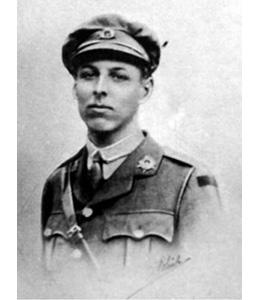Killed in action aged 20
Buried Ouillers Military Cemetery Somme France Plot 1 Row c Grave 31
David Harold was born at Pidley Parsonage, Pidley cum Fenton, the second son of the Revd Herbert W, and Marian M Macklin, and grew up in Houghton Conquest. When his father retired the family moved to White Wood Corner, Sandy, Bedfordshire.
In 1905, aged eight, David gained a Choral Scholarship to Christ Church Cathedral School and was there for six years becoming Head Boy and soloist. He then attended King’s School, Rochester, on a scholarship, where in his last year he became a prefect and a sergeant in the OTC. In June 1916 he was elected to a Sizarship (Dowman Organ Scholarship) at St John’s College, Cambridge, for Classics, having been at University College in London for about six months.
Before taking up his place at St John’s David repeatedly tried to join the army, being rejected seven times for short-sightedness. Eventually, he was accepted and in October 1916 joined 2nd Battalion 28th London Regiment, The Artists’ Rifles. In March 1917 he passed first out of the Cadet School and was commissioned and gazetted Second Lieutenant to 5th (Reserve) Bedfordshire Regiment, which he joined for training at Tring Camp. In June 1917 he qualified as Brigade Bombing Instructor at Godstone.
He joined the 4th Battalion, the Bedfordshire Regiment, on the Western Front on the 11 August 1917 as an Intelligence Officer. During January 1918 he had ten days‘ leave, and returned to France on 31st. On the 27th March 1918, the 4th Battalion was west of Albert and counter attacked German positions, resulting in heavy Officer casualties including 2/Lt Macklin.
A sad family story tells that Mrs Macklin was sitting on the veranda at White Wood Corner on the morning of 27 March 1918, when she saw 2nd Lt David Henry Macklin walking up the drive which was at the side of the house behind a hedge leading up to the front door which was off to the side. She leaped up in excitement saying “Oh David, how lovely, unexpected leave”. She went through the house to the front door, but when she opened it there was no-one there. She later received the dreaded telegram which said he had died about that time.
His name is on the War Memorials at St John’s College, Cambridge, Gamlingay, and Pidley cum Fenton.
(2nd Lieutenant Macklin’s name is listed at the end of the memorial - a list of former choristers, college servants or with some other close connection to Christ Church)


